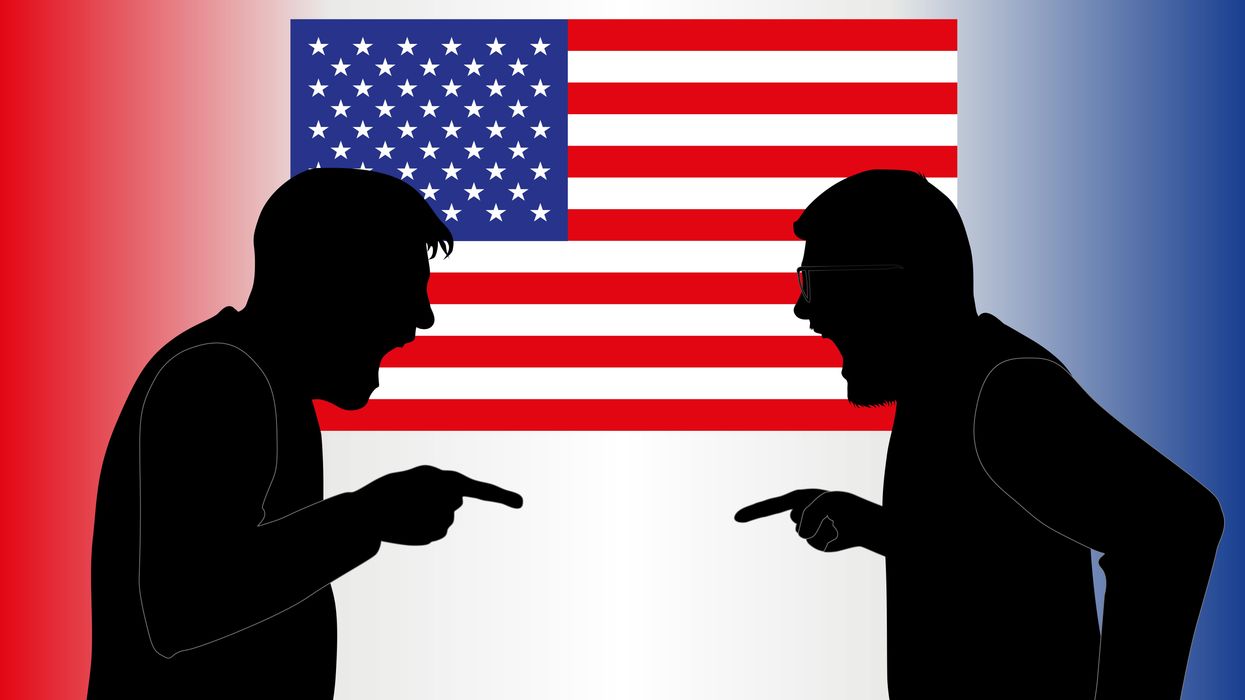Elwood is the author of “ Defusing American Anger ” and hosts the podcast “ People Who Read People.”
Recently, Supreme Court Justice Samuel Alito was surreptitiously recorded at a private event saying, about our political divides, that “one side or the other is going to win.” Many people saw this as evidence of his political bias. In The Washington Post, Perry Bacon Jr. wrote that he disagreed with Alito’s politics but that the justice was “ right about the divisions in our nation today.” The subtitle of Bacon’s piece was: “America is in the middle of a nonmilitary civil war, and one side will win.”
It’s natural for people in conflict to see it in “us versus them” terms — as two opposing armies facing off against each other on the battlefield. That’s what conflict does to us: It makes us see things through war-colored glasses.
And as more people embrace “we’re at war” framings and language, this amplifies the toxicity of the conflict — and can lead to a self-fulfilling prophecy.
The truth is that our conflict, like most conflicts, is complex and nuanced. It is not one side versus the other. It is not a binary battlefield. What we have are debates over a multitude of issues. Some of these issues do cluster in predictable ways, but that doesn’t mean it’s one side versus the other.
The truth is that many Americans have views that don’t abide by “Republican versus Democrat” or “left versus right” framings.
I’ll use myself as an example: I think some antiracism ideas are simplistic and divisive. Some people might categorize some of my views on that and other issues as conservative but I reject that label. I have other views that many would see as liberal but I’d reject that label, too. I don’t see my views as related to some overarching ideological divide or spectrum.
People who embrace a “we’re at war” framing would say that I and others must “pick a side.” But we don’t have to do that — and we shouldn’t do that.
The illogical pressures a polarized society places on us to align with all the stances of one political party or the other may be one reason so many people are no longer identifying as a Republican or Democrat.
To be clear, this is not to say that there aren’t important and emotion-provoking issues. There are. I personally think it’s of the utmost importance that Trump is defeated. But being against Trump doesn’t require a warlike, “one side will win” narrative. It’s a stance on a specific issue: Trump himself. And as with most issues, that stance can be held by both self-described liberals and self-described conservatives.
When we embrace warlike narratives about our divides, our divides get more toxic. And because animosity and fear lead to more extreme and non-negotiable stances, such framings also help create the very things many of us are upset about.
In their book “ The Myth of Left and Right,” Verlan and Hyrum Lewis make a persuasive case that “liberals” and “conservatives” are largely social groupings — not groupings based on a coherent, overarching ideology. The work of researcher Michael Macy supports this idea; he’s investigated how group stances can be formed in unpredictable, random ways. This more flexible and tribe-oriented view of our divides help explain how group stances can shift suddenly and dramatically (for example, Trump moving the GOP to economic stances previously associated with liberals).
“If people saw the reality of political pluralism, they’d see that both parties stand for many unrelated issues, some good, some bad. As is, they have the delusion that there is just one big issue, so if a party is on the correct side (left or right) of the one big issue, then they are correct about everything,” Hyrum Lewis wrote in a email.
People who wrongly perceive a winner-take-all battlefield fail to see that society can absorb and process conflicts in complex and unpredictable ways. Yes, some issues may have or require clear winners, but others might result in mixed outcomes or creative compromises. America’s mixed economy, with its capitalistic and socialistic aspects, shows how ideas that are sometimes framed as at-odds can coexist. Also, America is a big country; some stances on an issue might prosper in some areas of society but fail in others.
If we want to avoid worst-case scenarios of chaos, dysfunction and violence, we must think about how our narratives and language can make those scary paths either more likely or less likely.
We can reduce political toxicity by avoiding “we’re at war” and “left versus right” rhetoric. We can debate issues and work towards our own political goals without using such flattening and conflict-amplifying rhetoric.
Not only will that help reduce our political toxicity, it will help people be more persuasive in their activism on specific issues. When our divides are framed as a war between left and right, that makes it almost impossible for us to persuade someone on the “other side” who may have otherwise supported our stance on a specific issue. By promoting the idea that there’s no war but just a bunch of issues, that reduces team-based pressures on people and helps them make more nuanced choices.
To avoid worst-case scenarios in America, we’ll need to help politically passionate people see how avoiding warlike rhetoric isn’t just something they do for the country — but something that will help them achieve their own goals.




















